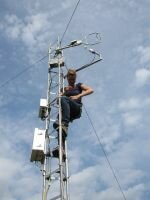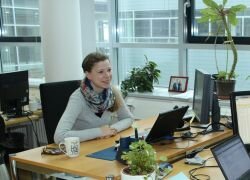- Details
- Created on Monday, 29 April 2013 15:23
Next in our research profile series is Fanny Kittler form the Max-Planck-Institute for Biogeochemistry in Jena Germany.
 photo by Fanny KittlerName
photo by Fanny KittlerName
Fanny Kittler
Institution
Max-Planck-Institute for Biogeochemistry
Nationality
German
Research Focus
Micrometeorological measurements and modeling of subarctic regions
How it is affiliated with the PAGE21 project?
I am interested in the impacts of the climate change on permafrost ecosystems. Therefore, I will conduct landscape scale measurements of carbon and energy fluxes to improve the understanding of the processes that control ecosystem-atmosphere exchange in this region. The overall objective is to develop upscaling procedures for these fluxes to improve training and evaluation of global climate models. For our research we will setup a new station in Cherskii (NE Siberia), which will also be included in the PAGE21 with the aim of improving the data coverage and getting new insights into the carbon cycle.
What is the current challenge within this topic?
Most of the measurement stations are located in a remote environment with harsh climatic conditions, which makes it very difficult to assembly and pursue measurements year round. Because of this there is a huge lack of understanding of the surface-atmosphere exchange processes mostly during the shoulder and non-growing season.
 Photo by Fanny Kittler
Photo by Fanny Kittler
How did it happen that you became a researcher?
I had never explicitly pursued becoming a researcher. I just chose a job with a topic I was interested in and which seemed very challenging to me.
Why do you like being the researcher?
The work of a researcher can be diversified because you are dealing with a lot of topics and your workplace can change from field, to lab and office. Furthermore I may travel to amazing places, I would never have the opportunity to visit otherwise.
How a typical working day looks like?
Most of the year I will be in my office preparing our next field and analyzing the data we already collected. But once or twice a year I will travel to our station for a certain time, to conduct some special experiments.
Funniest response ever when you told somebody that you are a "polar researcher"?
I never really called myself a polar researcher. I usally explain that I am researching on permafrost and therefore I will go to Siberia. The response to that is not funny at all, but it is always: "Then watch out for polar bears".
What are your plans for the upcoming three / five years?
My plan is to setup and pursue eddy-covariance measurements in Cherskii , analyze and publish these data and develop further experimental plans. All of this is included in my PhD program, which I am planning to finish in this time span.
What will be this years biggest challenges?
The first field trip to Cherskii of our team will be in spring/summer 2013. We hope that the setup, we are planning to construct, will work and deliver a lot of high quality data we can analyze.
 Photo by Fanny Kittler
Photo by Fanny Kittler